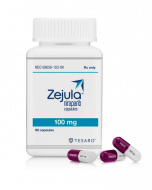Why is niraparib (Zejula) important for women with recurrent ovarian cancer?
Last updated: 01 November 2019

You can legally access new medicines, even if they are not approved in your country.
Learn more »
What is niraparib (Zejula)?
The European Medicines Agency has recently approved Niraparib (Zejula) for use in the European Union as a treatment for women struggling with a specific type of advanced ovarian cancer known as high-grade serous epithelial ovarian cancer, which includes cancers that affect the peritoneum and/or the fallopian tubes.
Niraparib (Zejula) was approved by the U.S. Food and Drug Administration on March 27, 2017 and is currently the most frequently prescribed PARP inhibitor for patients with ovarian cancer.
How effective is niraparib (Zejula)?
Niraparib (Zejula) is a medication that has been shown to increase progression-free survival among certain women who have recurrent ovarian cancer. This includes cancer of the fallopian tubes (which connect the ovaries to the uterus) and cancer of the peritoneum (a membrane lining the abdomen).
Specifically, niraparib (Zejula) increased median survival times among cancer patients with recurrent ovarian cancer by 138 percent to 282 percent. This means that some patients lived as much as three times longer when taking niraparib (Zejula).
You can also find other patients telling about their own experiences in patient communities like these on Inspire.
Niraparib (Zejula) works by blocking specific enzymes the body uses to repair DNA in cells. When these enzymes are blocked, cancer cells with damaged DNA can’t repair themselves and will ultimately die.
When is niraparib (Zejula) prescribed?
Doctors prescribe niraparib (Zejula) as a maintenance treatment when a patient has relapsed, which means that cancer has returned after treatment. This medication is usually administered after the patient has been treated with a platinum-based medication (these are medicines like cisplatin that use platinum as a cellular binding agent) and the tumour has shown partial or complete response.
Niraparib (Zejula) is prescribed in the form of capsules. The standard dosage is three capsules daily, and treatment is usually continued until the disease begins to progress. If patients experience severe side effects, the dosage may be changed.
What are the adverse reactions or side effects of niraparib (Zejula)?
The most common side effects experienced by people taking niraparib (Zejula) are gastrointestinal symptoms, anemia, tiredness, weakness, low platelet counts, low neutrophil counts, lack of appetite, headache, insomnia, respiratory symptoms, high blood pressure, dizziness, back pain, urinary tract infection and palpitations.
You cannot buy niraparib (Zejula) without a prescription from your doctor.
For more information about niraparib (Zejula), see our medicine product page.
---
About the author: Phillip McMullen
Phillip is a licensed physician who also holds a PhD in Microbiology and Immunology. He has nearly a decade of experience as a freelance writer.







